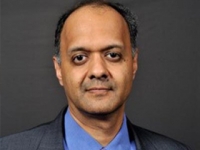Liberalization not only opened up Indian economy, it brought back home talent. In Coffee with Cafemutual, we chatted with Ravi Gopalakrishnan, Head of Equities, Principal Mutual Fund on work, life and everything in between.
Initial journey
Born and bought in Mumbai, Ravi was a commerce student. Since he was fascinated with the stock market during his college days, he opted for pursuing MBA and MS in Finance from the US. After completing higher studies, he joined a US based pharma company as a Financial Analyst in 1990.
Very soon, India opened up its gates for globalization and industrialization. As a result, Indian equity market was also evolving rapidly. This, coupled with the potential growth opportunities in Indian equity markets made Ravi rethink his decision of staying in US. His love for Indian equity markets encouraged him to quit his well-paying job and move to India.
Ravi got his first opportunity in India with UTI Mutual Fund. He was in the fund management team of India dedicated UTI offshore fund. Later, he moved to UBS as the Country Strategist. Ravi worked with Pramerica, Hudson Fairfax Group (USA) and Canara Robeco Mutual Fund. He has worked earlier with Principal where he was responsible for managing individual investment portfolios for corporate and non-corporate clients.
Early to bed, if time permits but early to rise is must
Ravi starts his day at 5.30 am. Recalling his early days, Ravi said, “I remember when I was in US, I used to start my day at 7 am. I had a morning review meeting at 7.30. This is how I developed this habit of staring early. No matter when I sleep, I wake up at 5.30. By doing this, I get a lot of time to meditate, read, manage work and exercise.”
Ravi reaches his office by 8 am and addresses a morning meeting at 9.30. In these meetings, Ravi and his team discuss companies, analyse corporate news or events and the economy in general. He leaves office by 6 pm.
Don’t call me a fund manager, call me research analyst
Ravi likes to call himself a research person as he spends most of time analyzing companies. He hunts for mispriced securities in the market, talks to company management regularly, reads balanced sheets and so on. He believes at the end of the day all fund managers are research analysts.
Easy and the difficult part of the job
For a fund manager, it is important to have a robust investment framework in order to take investment calls. Once a process and framework is established, the job becomes a lot easier, believes Ravi.
The most challenging part is sticking to these processes and framework with discipline during extreme market conditions. However, with experience and after seeing multiple cycles, this becomes easy. Another difficult part of his job according to Ravi is to decide when to sell. “You should be able to pull the trigger back if anything goes wrong. For me, it is important to recognise mistakes early and get out of them immediately.”
Fund management philosophy
We follow a bottom up approach to stock selection. Hence our investment philosophy is: “We believe that understanding the quality of the business is the most important variable in determining whether it creates or destroys wealth for the investor.”
Exit calls
Ravi does not sell stocks in one go. Just as he buys gradually, he sells gradually, unless the situation warrants a complete exit. Talking about his sell discipline, he said, “A lot of it is driven by company’s fundamentals. Valuations are important and it should justify the fundamentals. Another factor is to perform a sensitivity analysis on companies - and coming up with a base case, best case and worst case scenarios which helps in entry and exit decisions.”
No sectoral preference
Ravi is a bottom-up person, hence his stock selection methodology is sector agnostic.
Nevertheless, to give a broader picture, he feels that consumption has a long way to go. He strongly believes that with changing demography, consumption pattern will change. For example, most millennia’s tend to save less and spend more, particularly on discretionary items.
Other sectors that I am positive about are banks, financial services and insurance industry due to their low penetration. For sectors like construction and infrastructure, India is right at the bottom. These sectors need to pick up if the country wants to achieve a consistent growth rate of 8-9%, he said.
Near-term risk and outlook
Global factors such as trade war is one of the biggest near-term risks for the Indian equity market.
On near term market outlook, Ravi does not see a sharp recovery until the earnings revive meaningfully. However, according to him there are pockets where there are opportunities and investors should increase allocation to equities over the next couple of quarters due to attractive valuation.
Currently advocates multicap, mid and small cap funds
In the current market scenario, Ravi recommends multicap, mid and small cap funds to investors. He said there are opportunities in select large, mid and small cap stocks since they have corrected sharply. It is a good time for investors to increase their allocation to these type of funds.
Scheme mandate is important
Since Ravi has managed mutual funds, hedge funds, PMS and AIFs, we asked him which product is more interesting for him. He handled it diplomatically and said, “I think the mindset needs to be different for managing each one of them. For instance, you need more conviction to manage PMS products given the concentrated portfolios and to short a particular set of stocks in case of AIFs. Hence, a fund manager needs to understand the mandate and follow a different approach.”
Free time
Ravi loves playing football and squash. He plays these games during weekends. Apart from football, he has recently picked up taekwondo. He feels sports is entertaining and keeps him healthy.





